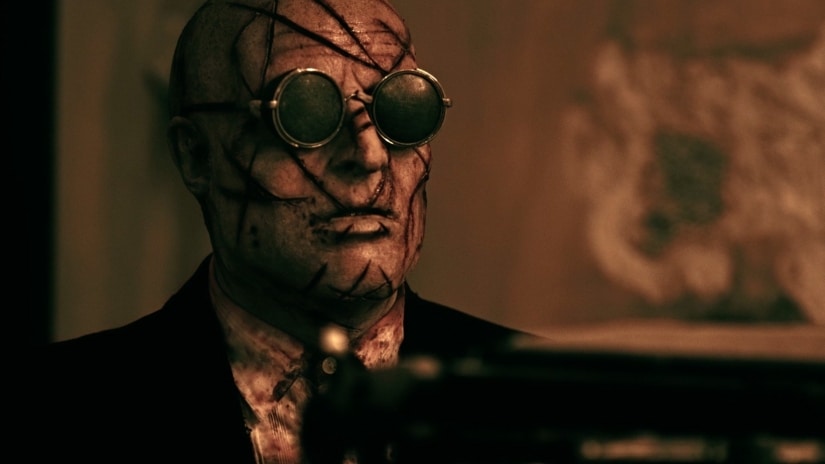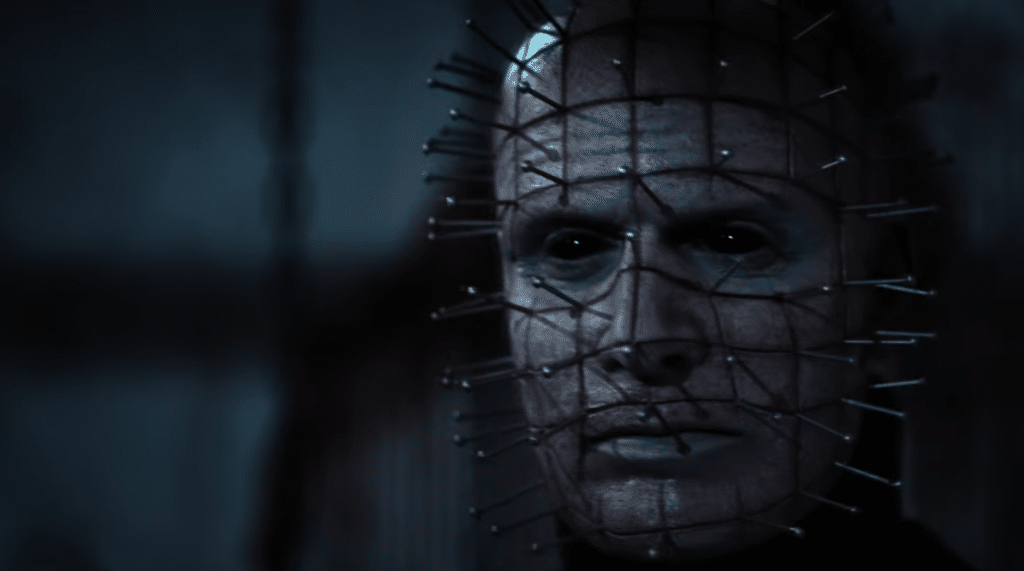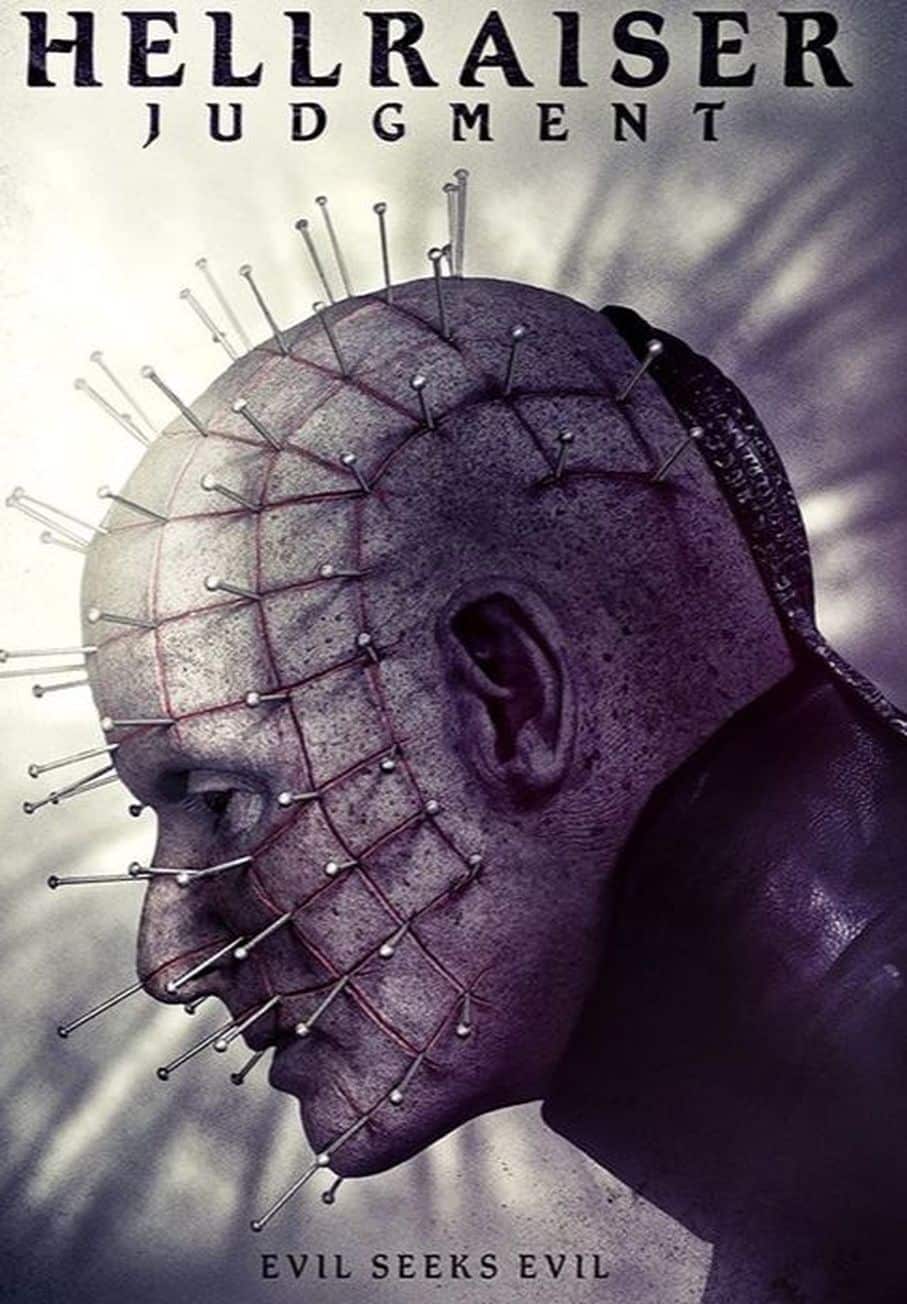 My relationship with the Hellraiser sequels is ambivalent at best, hostile at worst; as I’ve said previously, the first Hellraiser is rather important to me, and I’ve always yearned for a fully-realised entrant into the mythos to appear, but with the exception of Hellbound – itself a brilliant horror movie – I’ve always ended up disappointed. Obviously, the stakes are high when you’re so invested in an original film, but ever since the Worst Cenobite Ever in Hellraiser III: Hell on Earth (burning someone with a cigarette is hardly on par with the torments of hell) and then Hellraiser: Bloodlines (Pinhead! In space! With a dog!) there has been a series of dwindling returns; as our guest writer Oliver noted in his rundown of the Hellraiser sequels at that time, the franchise has been cruelly mistreated ever since – yet still, it heaves on. Oh! Why did they never make the sequel mooted by Barker, where the Lament Configuration was linked to the construction of the pyramids! Go big, or go home…
My relationship with the Hellraiser sequels is ambivalent at best, hostile at worst; as I’ve said previously, the first Hellraiser is rather important to me, and I’ve always yearned for a fully-realised entrant into the mythos to appear, but with the exception of Hellbound – itself a brilliant horror movie – I’ve always ended up disappointed. Obviously, the stakes are high when you’re so invested in an original film, but ever since the Worst Cenobite Ever in Hellraiser III: Hell on Earth (burning someone with a cigarette is hardly on par with the torments of hell) and then Hellraiser: Bloodlines (Pinhead! In space! With a dog!) there has been a series of dwindling returns; as our guest writer Oliver noted in his rundown of the Hellraiser sequels at that time, the franchise has been cruelly mistreated ever since – yet still, it heaves on. Oh! Why did they never make the sequel mooted by Barker, where the Lament Configuration was linked to the construction of the pyramids! Go big, or go home…
This brings us to Hellraiser: Judgment (god, that spelling of the word looks wrong to my eye). Written and directed by Gary J. Tunnicliffe, who has been involved in several of the direct-to-video sequels, it’s a film which does – to be fair – show some love for the original Hellraiser mythos, but it’s clearly been hamstrung by a lethal combination of budget constraints and a confused approach which seeks to bring numerous genre tropes into the same narrative. The resulting film is a watchable, but infuriatingly thin piece of work which repeats the errors of several of the prior DTV sequels.
The film begins with Pinhead – no longer played by Doug Bradley, but by one Paul T. Taylor – ruminating on a modern world now too satiated with technology to be interested in a mere “wooden box”. Who’d have thunk it – the Lament Configuration box is just too lo-fi these days. (Quick, get some into a hipster bar.) However, in conversation with what I can only describe as his new PA, Pinhead reaffirms his ability to tempt sinners; he’ll just find new means of achieving it. Cut to a down-and-out, a Mr. Watkins, receiving a strange, typed letter which invites him to a deserted address on the outskirts of the city. Being an idiot, he goes. It turns out that Watkins has some dark secrets in his past, secrets which the sender clearly knows about: in a sequence which actually showcases some neat ideas and repulsive imagery, Watkins is ‘judged’; perhaps Pinhead’s new search for souls is by appointment only, but in any case, he’s soon bagged his first.
Disappointingly, we leave this part of the plot to segue into something akin to a Se7en-style serial killer case: one of the irritating flaws of Hellraiser sequels is a tendency to park the Cenobites somewhere before heading off into new territory altogether. It’s both a tease and a waste. But anyway, it is what it is, again, so we begin to follow the fortunes of detective brothers David and Sean Carter – who are hot on the heels of a Bible-inspired serial murderer going under the name of The Preceptor. Aided by new girl Christine Egerton (Alexandra Harris) they aim to catch The Preceptor before he enacts the rest of the deadly sins Ten Commandments via his crimes. However, while they try to solve the whereabouts of the killer, elder brother Sean (Damon Carney) is increasingly going it alone, and his state of mind is leading him into some strange, unsettling territory…
 In the melee, there are some decent ideas here. The idea of an affinity between deviants and demons is of course nothing new, but exploring it in a modern, urban setting still has some promise, lending old Judeo-Christian ideas a grimy horror patina. The idea of being judged at the Pearly Gates is transformed into a demonic admin exercise here – it’s different, and it has potential. Although the presence of T&A doesn’t exactly fit in with the other monsters in this mythos, these scenes are book-ended with material which gets close to the dark, maggoty horror of the first two Hellraisers, and a few moments in the script display some love and knowledge of the source material, which at least shows that Tunnicliffe isn’t just winging it here. As for Pinhead himself, well – when he’s on screen, he’s…okay. He’s blank, rather than malevolent; his garb has obviously been simplified for reasons of expediency, but the make-up is reasonably good. We have to remember that Doug Bradley wasn’t exactly able to shine in his last few appearances in his hallmark role, either, so as far as the sequels go, Taylor does a reasonable job with what he has.
In the melee, there are some decent ideas here. The idea of an affinity between deviants and demons is of course nothing new, but exploring it in a modern, urban setting still has some promise, lending old Judeo-Christian ideas a grimy horror patina. The idea of being judged at the Pearly Gates is transformed into a demonic admin exercise here – it’s different, and it has potential. Although the presence of T&A doesn’t exactly fit in with the other monsters in this mythos, these scenes are book-ended with material which gets close to the dark, maggoty horror of the first two Hellraisers, and a few moments in the script display some love and knowledge of the source material, which at least shows that Tunnicliffe isn’t just winging it here. As for Pinhead himself, well – when he’s on screen, he’s…okay. He’s blank, rather than malevolent; his garb has obviously been simplified for reasons of expediency, but the make-up is reasonably good. We have to remember that Doug Bradley wasn’t exactly able to shine in his last few appearances in his hallmark role, either, so as far as the sequels go, Taylor does a reasonable job with what he has.
Still, as much as there are a few positives, there are – sadly – plenty more negatives. The first major sticking-point, for me, are the layers of incomprehensible decisions which underpin the film’s action throughout. Hellraiser: Judgment is hardly the first offender in this respect, but almost from the first, its characters act unscrupulously, or do things which make no sense – all to advance a plot which already seems to hinge on very little. Acting incomprehensibly in a tenuous universe only compounds the issues of the latter, and doubles the distance between audience and characters. The way in which the film abruptly becomes a torture porn film also grated upon me; it feels like an idea is being mis-sold when it switches in this way, and as someone who was completely sated with this kind of thing after the Saw movies, I feel like any inclusion of this theme needs to be far more closely interlinked with those Hellraiser elements which will no doubt bring an audience to this film. As it stands, it felt like two separate films, overstretched by the bringing-together, and eventually joined by an unconvincing epilogue – and don’t get me started on that particularly trite, well-tailored final nod to Judeo-Christian belief which made me throw up my hands.
In fact, the more I come to think of it, the more I feel that Judgment is unsettlingly familiar to Hellraiser: Inferno (2000) in more ways that one – and similar to a few of the later sequels, too, in terms of its plot and its problems. These monsters are crying out for a film which has the will and the means to make more of them. I mean, Hellraiser (1987) barely put the Cenobites on screen – but they were very much present throughout the film. It can be done.
So, despite a few ambitious ideas, Hellraiser: Judgment is, I’m afraid to say, another one of those sequels. It starts fairly promisingly, but becomes a cop out with cops – yet another missed opportunity to really go somewhere with these no doubt exasperated demons who should be allowed to do their thing or stay off our screens altogether.
Hellraiser: Judgment is released on 13th February 2018.
